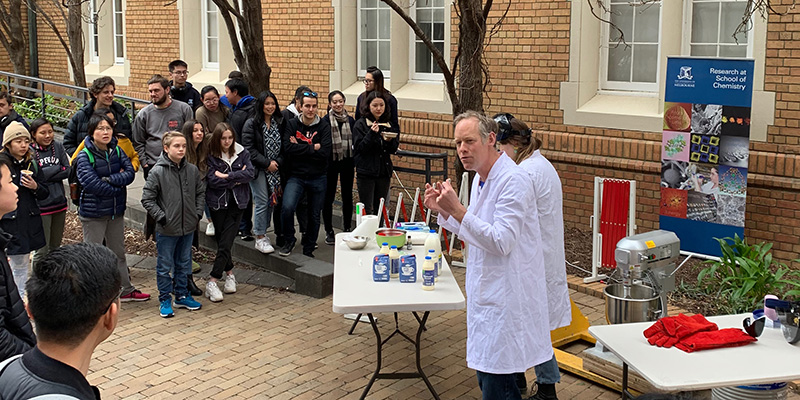Science Festival 2025
11-15 August 2025
A celebration of scientific knowledge, innovation and progress.
Now in its 11th year, the University of Melbourne’s annual Science Festival is a week-long celebration of National Science Week, with a series of free events for students, staff and the general public.
From public lectures and expert-led masterclasses to lab experiences, games and activities, the festival has something for everyone.
Relive this year's marquee events
-
How to think like a spy: the science of intelligence (6 August)
In this public lecture, learn how intelligence analysts use big data to monitor populations, improve cyber and biosecurity risks, and detect deception. Watch the recording now.
-
Online Masterclasses (11-13 & 15 August)
Explore the research and impact of rising science stars from the University of Melbourne in these interactive online masterclasses. Watch the recordings now.
-
Behind the Science Lab Experiences (11-14 August)
Step inside some of the University’s state-of-the-art laboratories and most unusual museums on the historic Parkville campus in the heart of Melbourne. Read more.
Is your school group interested in attending future Science Festival events? Email science-events@unimelb.edu.au for more information.
Missed out on previous years' events?
-
Expo showcases STEMM collaboration and innovation (2024)
A hands-on research expo spanning science, technology, engineering, mathematics and medicine (STEMM) was a Science Festival highlight.
-
Model citizens: how mathematicians are helping the planet (2024)
A panel discussion about the practical applications of advanced mathematics and statistics that are solving some of the world's most pressing challenges.
-
Mid-afternoon Masterclasses (2024)
Topics ranged from superbugs and coconut-cracking rats, to chicken health, wine making, and how to use historical records to improve our understanding of weather patterns.
-
Science gets real – from problem to lab innovation to real-world impact (2023)
A panel event with scientists whose innovations are solving real-world problems. Speakers discussed lessons learned that could help others.
-
Should we care about science denialism? (2023)
How concerned should we be about the unscientific opinions of influencers? In this panel event, a diverse group of experts discussed science denialism.
-
Mid-afternoon Masterclasses (2023)
This year's Masterclasses explored El Niño, diamonds in volcanoes, patterns in AI, how to keep your furry friends happy, and the art of food science.
-
Collaborate to Innovate Expo (2023)
Our inaugural expo featured a series of installations showcasing the latest STEM research across the University of Melbourne.
-
Discoveries that changed our world (2022)
Learn about the science discoveries that changed our world in this public lecture with Dr Suzie Sheehy.

About the Science Festival
Since 2015, the University of Melbourne has celebrated National Science Week with an annual, week-long Science Festival, showcasing the latest in STEM research across our faculties, schools, institutes and centres through free public events.
Questions?
Faculty of Science Events Team
science-events@unimelb.edu.au
Acknowledgement of Country
The University of Melbourne acknowledges the Traditional Owners of the unceded land on which we work, learn, and live: the Wurundjeri Woi-wurrung and Bunurong peoples (Burnley, Fishermans Bend, Parkville, Southbank and Werribee campuses), the Yorta Yorta Nation (Dookie and Shepparton campuses), and the Dja Dja Wurrung people (Creswick campus).
Indigenous Australians have been custodians of the lands and waterways of this country for thousands of years. As Australia’s first scientists, Aboriginal and Torres Strait Islander peoples have deep and enduring knowledge of the land, waters, and skies. We pay respect to Elders past, present, and future, and acknowledge the importance of Indigenous knowledge in the Academy. As a community of researchers, teachers, professional staff, and students we are privileged to work and learn every day with Indigenous colleagues and partners.